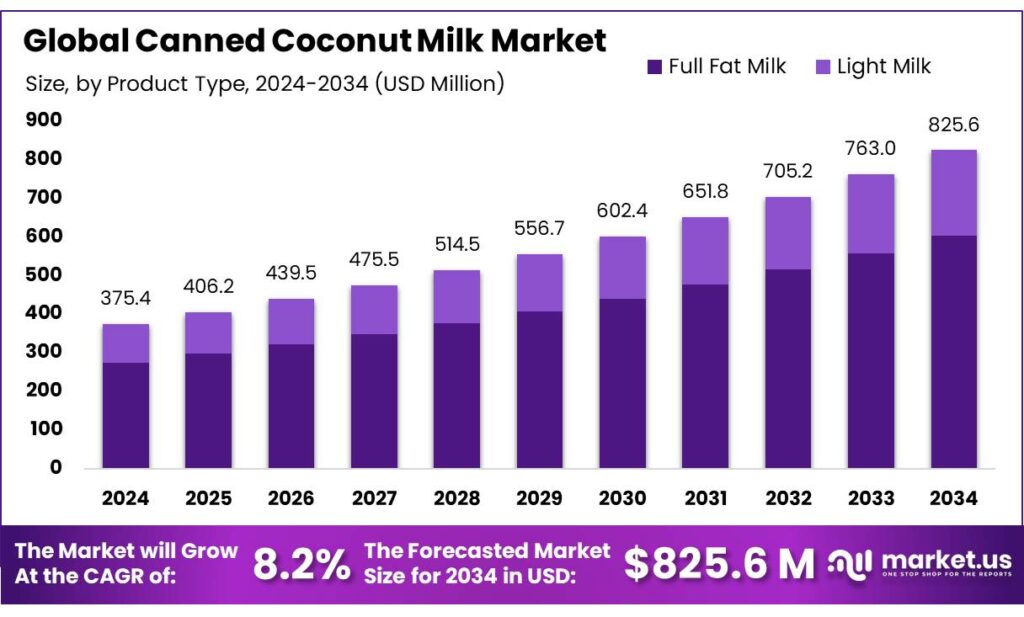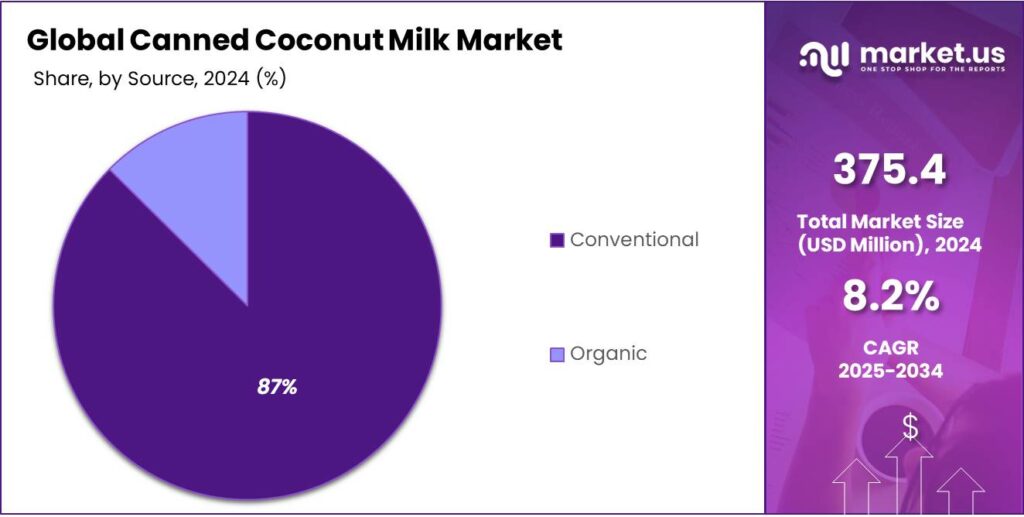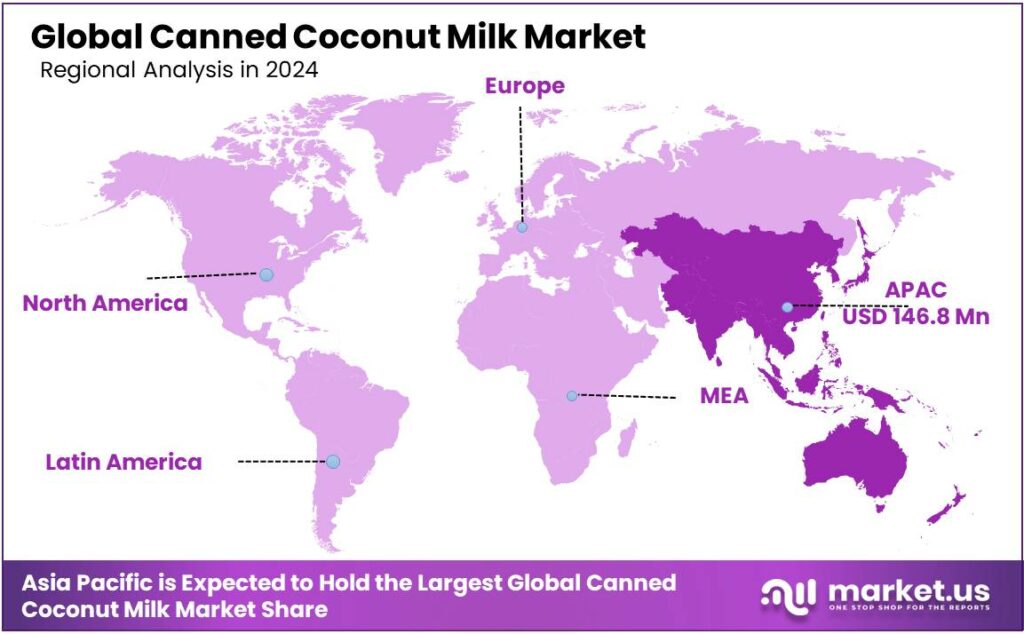Global Canned Coconut Milk Market By Product Type (Full Fat Milk and Light Milk), By Source (Organic and Conventional), By Application (Food Processing, Beverage Industry, Household Use, Food Service Operators, and Others), By Distribution Channel (Direct Sales and Indirect Sales), By Region and Companies - Industry Segment Outlook, Market Assessment, Competition Scenario, Trends and Forecast 2025-2034
- Published date: Aug 2025
- Report ID: 156566
- Number of Pages: 326
- Format:
-
keyboard_arrow_up
Quick Navigation
Report Overview
The Global Canned Coconut Milk Market size is expected to be worth around USD 825.6 Million by 2034, from USD 375.4 Million in 2024, growing at a CAGR of 8.2% during the forecast period from 2025 to 2034. In 2024, Asia Pacific held a dominant market position, capturing more than a 39.1% share, holding USD 146.8 Million revenue.
Coconut milk is an oil-protein to water emulsion extracted from fresh, grated coconut kernel. It is obtained by manual or mechanical extraction of comminuted coconut meat, with or without water. The coconut milk extracted with water at 80°C and having a pH of 8 yielded milk with the highest total solids. The most canned coconut milk brands provide full-fat milk. It has various applications in food processing and the beverage industry, and is a staple ingredient in various Asian cuisines.

The major driver of the market is the rising awareness regarding lactose intolerance in consumers. In many countries, there is a shift towards veganism, which boosts the canned coconut milk market. It is a healthy, vegan alternative to dairy milk. The main restraint for the market is the level of organization and the lack of investments. Most of the coconut products consumed globally are produced in Southeast Asia, where almost all the output comes from local players.
- According to the International Coconut Community, a UNESCAP intergovernmental organization, over 60 million metric tons of coconuts are produced annually in the world.
Key Takeaways
- The global canned coconut milk market was valued at US$ 375.4 million in 2024.
- The global canned coconut milk market is projected to grow at a CAGR of 8.2% and is estimated to reach US$ 825.6 billion by 2034.
- Based on product type, full-fat milk dominated the market with a 73.2% share of the total global market in 2024.
- Based on the source, in 2024, conventionally sourced canned coconut milk led the market with a substantial market share of 87.4%.
- Among the applications, the household sector dominated the market with a 37.5% market share.
- In 2024, the canned coconut milk market was dominated by indirect sales with a market share of 65.8%.
- In 2024, the Asia Pacific was at the forefront of the global canned coconut milk market with a market share of 39.1%.
Product Type Analysis
Full-Fat Coconut Milk Dominated the Market in 2024 Due to Its Flavor and Texture.s
On the basis of product type, the canned coconut milk market is divided into full-fat milk and light milk. In 2024, full-fat coconut milk led the market with a substantial 73.2% share of the total global market. Full-fat coconut milk is often preferred over low-fat for its richer flavor, creamier texture, and ability to enhance the taste and mouthfeel of dishes. It is mostly used for cooking in dishes where coconut milk is a primary ingredient, such as curries, soups, and desserts, while low-fat milk is favored for drinking purposes.
There are 16.9 grams of fat per 100 grams of milk in standard coconut milk, almost as much as single cream, while reduced-fat coconut milk or light milk contains 7.7 grams of fat, but it is still high in saturated fat. Full-fat milk contains more saturated fat, but it also provides beneficial fatty acids like lauric acid, which has antimicrobial properties. A daily dose of 10 to 20 grams of lauric acid is recommended, which can be acquired from 6 to 12 ounces of good-quality coconut milk.
Source Analysis
Conventionally Sourced Canned Coconut Milk Led the Market.
Based on the source, the market is divided into organic and conventional. In 2024, milk from conventionally sourced coconut dominated the market, capturing approximately 87.4% of the total global market share. Conventional farming can potentially increase production and reduce costs. Organic farming generally involves higher production costs, primarily due to increased labor demands and potentially lower yields compared to conventional methods.
Additionally, organic farming requires a three-year transition period, where farmers must follow organic standards but cannot sell their produce at premium prices, impacting profitability during this period. Furthermore, navigating the certification process, including paperwork and inspections, can be particularly challenging for small-scale farmers, potentially deterring them from pursuing certification.

Application Analysis
Food Processing Applications of the Canned Coconut Milk Outperformed Several Others in 2024.
Based on the applications of the canned coconut milk, the market is segmented into food processing, the beverage industry, household use, food service operators, and others. In 2024, the household sector dominated the global market, accounting for approximately 37.5% of the total share, overtaking other applications. Due to its distinct flavor and adaptability, coconut milk is a widely used ingredient in a variety of meals all over the world.
However, during food and beverage production, typical canned coconut milk faces significant drawbacks, such as consistency and quality control. Another major sector using coconut milk is food service operators. It is a highly versatile ingredient in global cuisines, offering a creamy texture and a subtle, distinctive flavor to a wide array of dishes, both savory and sweet.
Distribution Channel Analysis
Indirect Sales of Coconut Milk Dominated the Market in 2024 due to its Popularity in Global Cuisines.
The canned coconut milk market is segmented into direct and indirect sales based on their distribution channels. The indirect sales of canned coconut milk, such as sales from supermarkets and convenience stores, dominated the market with 65.8% of the total market share, due to its popularity in the household sector. As coconut milk becomes a staple in home kitchens worldwide, retail penetration has deepened, particularly in urban and multicultural areas.
Consumers increasingly seek out canned coconut milk for preparing Asian dishes. In the UK, over 40% of households now incorporate Asian or fusion meals at least once a week, prompting higher off-the-shelf purchases of ethnic ingredients like coconut milk. In addition, the rise of plant-based diets has also driven individual consumers to choose coconut milk as a dairy-free alternative for coffee, smoothies, and desserts, further boosting supermarket sales.
Key Market Segments
By Product Type
- Full Fat Milk
- Light Milk
By Source
- Organic
- Conventional
By Application
- Food Processing
- Bakery Products
- Dairy Alternative Products
- Ready Meals
- Protein Bars
- Sauces, Condiments & Dressings
- Others
- Beverage Industry
- Household Use
- Food Service Operators
- Others
By Distribution Channel
- Direct Sales
- Indirect Sales
- Supermarkets & Hypermarkets
- Convenience Stores
- Online Retail
- Others
Drivers
Awareness Regarding Lactose Intolerance Drives the Canned Coconut Milk Market.
The increasing awareness regarding lactose intolerance among consumers drives the canned coconut milk market. According to the United States National Institute of Health, globally, 65% to 70% of the population exhibits lactose intolerance, most commonly in its primary form. In recent years, more consumers are becoming aware of human health, which has resulted in a growing demand for zero-lactose products. The canned coconut milk does not contain lactose and is lower in carbohydrates than dairy milk, which can be consumed by lactose-intolerant people.
Additionally, it serves as a much richer source of iron, copper, and niacin, also called vitamin B-3, than regular milk. Furthermore, coconut milk is lower in sugar than dairy milk, which is beneficial to limit carbohydrates in the diet. It contains a variety of nutrients that have several health benefits. Magnesium modulates blood sugar levels, phosphate strengthens bones, selenium decreases joint inflammation, and manganese helps to prevent osteoporosis. Similarly, a daily dose of 10 to 20 grams of lauric acid is recommended, which can be acquired from 6 to 12 ounces of good-quality coconut milk.
Restraints
Competition from Alternatives Might Pose a Challenge to the Market.
The canned coconut milk segment faces mounting pressure from a growing array of plant-based alternatives that offer varied flavors, textures, and often more competitive pricing. Globally, almond milk and oat milk dominate the plant-based category, making them formidable substitutes for coconut milk in everyday use. Oat milk is emerging rapidly, appreciated for its creamy texture and sustainability appeal, and is gaining significant traction in coffee shops.
These alternatives often edge out coconut milk on price. Almond and oat options are generally cheaper, while coconut milk tends to command a higher retail price owing to its production complexities and transportation costs. Taste and affordability become the purchase factors for products such as coconut milk. Additionally, the market faces challenges such as a lack of investments due to the unorganized nature of the sector. Similarly, coconut products are very sensitive to contamination.
Opportunity
Fortified and Flavored Canned Coconut Milk Creates Opportunities in the Market.
Fortified and flavored canned coconut milk is creating opportunities in the competitive market by meeting evolving consumer expectations for both health and indulgence. In recent years, fortified plant-based beverages are gaining traction, including coconut milk, providing added nutrients. For instance, fortified brands commonly deliver heightened levels of vitamin B12 per serving and modest levels of vitamin D, while calcium fortification varies widely among beverage types.
Similarly, in flavored variants, manufacturers are exploring creative profiles to attract new consumers, with offerings including mango, durian, matcha, red bean, taro, coffee, Thai tea, and chocolate. This trend highlights how flavored canned coconut milk taps both traditional taste preferences and novelty seekers. Similarly, in India, brands infuse coconut milk with local tastes, such as cardamom and vanilla, to cater to regional flavor affinities, resulting in favorable repeat purchase rates. The fortification addresses nutritional gaps for vegan or dairy-free consumers, while flavor innovation adds functional indulgence and cultural resonance.
Trends
Shift Towards Veganism
The rising tide of veganism is significantly reshaping the canned coconut milk market, as plant-based diets gain mainstream appeal driven by ethical, health, and environmental considerations. In 2025, research calculated that approximately 25.8 million individuals globally tried veganism in January 2025. Coconut milk is made from coconuts and does not contain any animal-derived ingredients, making it suitable for vegans.
Plant‑based milks, including coconut, are increasingly embraced as part of sustainable food choices. Over the years, dairy consumption has declined drastically. Coconut milk’s versatility in various culinary applications, from beverages to desserts, further fuels its popularity. Manufacturers are developing new coconut milk-based products, including flavored options and convenient packaging, to cater to diverse consumer preferences.
Geopolitical Impact Analysis
Geopolitical Tensions Disrupt the Supply Chains, Leading to Increased Prices.
Geopolitical tensions have increasingly strained the coconut milk market, particularly through disruptions in shipping routes and trade fragmentation. For instance, in 2024, heightened instability in the Red Sea, stemming from Middle Eastern conflicts, prompted many vessels to avoid the Suez Canal and reroute around the Cape of Good Hope. This has magnified logistical tailbacks and inflated freight charges for Asian exporters, often forcing firms to push up retail prices. Highly concentrated production in Southeast Asia makes the supply chain particularly vulnerable to policy shifts and tariffs.
In Indonesia, policy-induced export restrictions to shield domestic processors have reduced plant utilization. Similarly, the reciprocal tariffs imposed by the United States have significantly increased prices. For instance, before increased tariffs, the price of coconut milk in Colorado was US$70 per case, which rose to US$80 per case. The geopolitical dynamics, such as route rerouting, inward-looking trade policies, trade tariffs, and concentrated production, have heightened price volatility and undermined supply chain reliability, compelling buyers and manufacturers to restructure their business models.
Regional Analysis
Asia Pacific is the Vanguard in the Global Canned Coconut Milk Market.
Asia Pacific is the vanguard of the global canned coconut milk market, holding about 39.1% of the market in 2024, valued at approximately US$ 146.8 million. Coconuts thrive in warm, humid, tropical climates with abundant rainfall, and are most habitable in Asia. According to the International Coconut Community, in 2024, the Asia Pacific produced the most coconuts, around 73.4%, with Indonesia producing over 17 million metric tons, the Philippines over 14, and India over 13 million metric tons of coconuts.
In addition, these three countries are the largest exporters of coconut and coconut products, such as oil and milk. In addition to production, the region is the largest consumer of the coconut and its products. Coconut milk is a staple ingredient in various Asian cuisines. In countries like Thailand, India, Indonesia, and the Philippines, coconut milk is a crucial ingredient in daily dishes. For instance, it is a key ingredient in Thai curries, Indian curries, and Malaysian dishes like Nasi Lemak.

Key Regions and Countries
- North America
- The US
- Canada
- Europe
- Germany
- France
- The UK
- Spain
- Italy
- Russia & CIS
- Rest of Europe
- APAC
- China
- Japan
- South Korea
- India
- ASEAN
- Rest of APAC
- Latin America
- Brazil
- Mexico
- Rest of Latin America
- Middle East & Africa
- GCC
- South Africa
- Rest of MEA
Key Players Analysis
McCormick & Company, Takari International, Thai Agri Foods, Theppadungporn Coconut, Nature’s Charm, Goya Foods, Grace Foods, Edward & Sons, Siam Coconut, and Natural Value are the key players in the global canned coconut milk market. As the canned coconut milk market is very niche and competitive, many players get engaged in strategic activities, such as product development, mergers, and partnerships. For instance, in July 2025, a Chinese company invested US$100 million to build a coconut processing plant in Indonesia that supports the government’s efforts to boost local industrialization and reduce the country’s dependence on raw coconut exports.
Thai Agri Foods Public Company Limited (TAF) is a leading Thai food manufacturer and exporter, including coconut milk, based in Thailand. The company has experienced consumer trust and a robust brand identity due to its operation since 1991. The company has also penetrated most markets, and its products are sold in more than 70 countries worldwide. Theppadungporn Coconut is a leading manufacturer and retailer of coconut products. The company is known for its quality products and for its monkey-free labor since 2024. Goya Foods is a global player in the coconut and its products industry and provides a broad range of products.
The Major Players in The Industry
- McCormick & Company, Inc.
- Takari International Inc.
- Thai Agri Foods Public Company Limited
- Theppadungporn Coconut Co., Ltd.
- Nature’s Charm
- Goya Foods, Inc.
- Grace Foods
- Edward & Sons Trading Co.
- Siam Coconut Public Company Limited
- Natural Value, Inc.
- Other Key Players
Key Development
- In February 2025, Whole Moon released its coconut milk, a creamy and refreshing addition to its lineup that uses whole coconut meat and no oils, creams, or parts.
- In May 2025, Cococo, a leading exporter of processed coconut milk and coconut water products in Thailand, introduced several innovative coconut products at THAIFEX-Anuga Asia 2025.
Report Scope
Report Features Description Market Value (2024) US$375.4 Mn Forecast Revenue (2034) US$825.6 Mn CAGR (2025-2034) 8.2% Base Year for Estimation 2024 Historic Period 2020-2023 Forecast Period 2025-2034 Report Coverage Revenue Forecast, Market Dynamics, Competitive Landscape, Recent Developments Segments Covered By Product Type (Full Fat Milk, Light Milk), By Source (Organic, Conventional), By Application (Food Processing, Beverage Industry, Household Use, Food Service Operators, Others), By Distribution Channel (Direct Sales, Indirect Sales) Regional Analysis North America – The US & Canada; Europe – Germany, France, The UK, Spain, Italy, Russia & CIS, Rest of Europe; APAC– China, Japan, South Korea, India, ASEAN & Rest of APAC; Latin America– Brazil, Mexico & Rest of Latin America; Middle East & Africa– GCC, South Africa, & Rest of MEA Competitive Landscape McCormick & Company, Inc., Takari International Inc., Thai Agri Foods Public Company Limited, Theppadungporn Coconut Co., Ltd., Nature’s Charm, Goya Foods, Inc., Grace Foods, Edward & Sons Trading Co., Siam Coconut Public Company Limited, Natural Value, Inc., Other Key Players. Customization Scope Customization for segments, region/country-level will be provided. Moreover, additional customization can be done based on the requirements. Purchase Options We have three licenses to opt for: Single User License, Multi-User License (Up to 5 Users), Corporate Use License (Unlimited Users and Printable PDF) 
-
-
- McCormick & Company, Inc.
- Takari International Inc.
- Thai Agri Foods Public Company Limited
- Theppadungporn Coconut Co., Ltd.
- Nature's Charm
- Goya Foods, Inc.
- Grace Foods
- Edward & Sons Trading Co.
- Siam Coconut Public Company Limited
- Natural Value, Inc.
- Other Key Players










